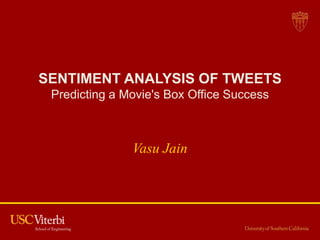
Sentiment analysis of tweets [SCSE, 13]
- 1. SENTIMENT ANALYSIS OF TWEETS Predicting a Movie's Box Office Success Vasu Jain
- 2. AGENDA 1. Introduction 2. Related Work 3. Methodology 4. Experiments 5. Conclusion 6. Quse/Ans Image source: SNLP Slides for Sentiment Analysis
- 3. INTRODUCTION About Twitter • Social networking and microblogging service • Enables users to send and read messages • Messages of length up to 140 characters, known as "tweets". Tweets contain rich information about people’s preferences. People share their thoughts about movies using Twitter. Data analysis on twitter data to predict the success of a movie.
- 4. INTRODUCTION People’s opinions towards a movie have huge impact on its success. Our project includes prediction using Twitter data, and analysis of the prediction results. High volume of positive tweets may indicate success of a movie. But how to quantify ? Image source: http://www.demainlaveille.fr/2012/05/06/pourquoi-twitter-ne-peut-pas-predire-les-elections-presidentielles/
- 6. RELATED WORK Using social media to predict the future becomes very popular in recent years. • Predicting the Future with Social Media (Sitaram Asur & Bernardo A. Huberman, 2010) tries to show that twitter-based prediction of box office revenue performs better than market-based prediction. • Predicting IMDB movie ratings using social media (Andrei Oghina, Mathias Breuss, Manos Tsagkias & Maarten de Rijke 2012) uses twitter and youtube data to predict the imdb scores. Our project includes prediction using Twitter data and investigation on two new topics based on the prediction results.
- 7. RELATED WORK • Predicting the results of presidential election (USC Annenberg Innovation Lab & USC SAIL). • Sentiment 140 to discover the Twitter sentiment (sentiment140.com) . No movie prediction is provided.
- 8. OUR WORK • Data Collection: existing twitter data set and recent tweets via Twitter API • Data Pre-processing: get the "clean" data and transform it to the format we need • Sentiment Analysis: train a classifier to classify the tweets as: positive, negative, neutral and irrelevant • Prediction: use the statistics of the tweets' labels to predict the movie success (hit/flop/average)
- 9. METHODOLOGIES: Data Collection & Crawling 2009 Data set Subset of Stanford dataset (now unavailable) • 477 Million Tweets, period of June – Dec 2009 • Filtered tweets during critical period for movie • 68.7 GB datasets (compressed format) • 30 movies, 6 Million relevant Tweets 2012 Data set live crawling using a script • Streaming API of python library for Twitter to collect data • Data Retrieval using keywords for movies • Data collection focus on critical period • 8 Movies, 2.5 Million Tweets Image source: http://drupal.org/project/twitterminer
- 10. METHODOLOGIES: Data Collection & Crawling 160000 140000 120000 100000 80000 60000 40000 20000 0 week -6 week -5 week -4 week -3 week -2 week -1 week 0 week 1 week 2 week 3 week 4 week 5 week 6 week 7 week 8 week 9 week 10 week 11 week 12 week 13 week 14 week 15 week 16 week 17 week 18 week 19 week 20 week 21 week 22 week 23 week 24 Tweets Number Critical Period for movie “Harry Potter and the Half-Blood Prince". Show the relationship between sent time and number of tweets for the movie Image source: http://drupal.org/project/twitterminer
- 11. METHODOLOGIES: Data Preprocessing Why data preprocessing ? • Lot of noisy, spam, irrelevant tweets in our dataset • Convert the data to input format for our sentiment analysis tools. Techniques for preprocessing: • Removing URLs, user handles • Language detection to discard tweets not in English • Split the dataset into small chunks ~25000 Tweets/Chunk • Process chunks distributely • Filter for tweets related to target movies using regular expression. Image source: http://mashable.com/2012/03/18/tweets-more-trustworthy-study/
- 12. METHODOLOGIES: Sentiment Analysis Algorithm: • Labelling tweets using Lingpipe sentiment analyzer, a natural language processing toolkit. • Sentence (tweet) based analysis with a logistic regression classifier. (Accuracy up to 80%) • Training & evaluation using 2009 dataset, testing on 2012 dataset. • Trained classifier labels tweet as positive, negative, neutral or irrelevant. • Calculate PT-NT Ratio for every movie. PT-NT Ratio is a function over parameters positive tweet ratio, negative tweet ratio, total tweets, neutral tweets, irrelevant tweets. • Thresholds to determine regions for PT-NT Ratio. Each region corresponds to Hit, Flop, Average results for movies. • Movie success correlated with PT-NT Ratio.
- 13. Experiments: Analysis of 30 Movies (Released in 2009)
- 14. Experiments: Movies vs. P/N Ratio, Profit Ratio
- 15. Experiments: Movies (Released in 2009) vs. PT-NT Ratio
- 16. Experiments: Analysis of 8 Movies (Released in 2012)
- 17. Experiments: Movies (Released in 2012) vs. PT-NT Ratio
- 18. Conclusion Prediction for 2012 movies using our analysis: 5 movies: Hit 1 movie: Super hit 1 movie: Average business Could not determine success rate for one due to it data unavailability. Comparing our prediction results with box office results till date Prediction: exactly right for four cases On border line between hit and average for one case For remaining movies we lack data to check our prediction onfidence . Half accuracy score if movie’ s classification near border. Score of 4.5 out of 5 for accuracy that is equal to 90%. Great achievement for our model even though there were limitations with number of movies, hand labeled tweets etc.
- 19. Future Work Bottlenecks: 1. Twitter data crawled by third party. 2. Limitation with Twitter APIs for crawling data. 3. Noise included in randomly picked 200 tweets. 4. Movies being released in limited number of theaters (Not enough data) With more data, model can be more accurate and reliable. Future work: 1. Using different other models and algorithms. 2. Temporal analysis can be added as a future work in the project. 3. Consideration of Retweets as a factor Image source: http://www.theispot.com/whatsnew/2012/2/brucie-rosch-twitter-data.htm
